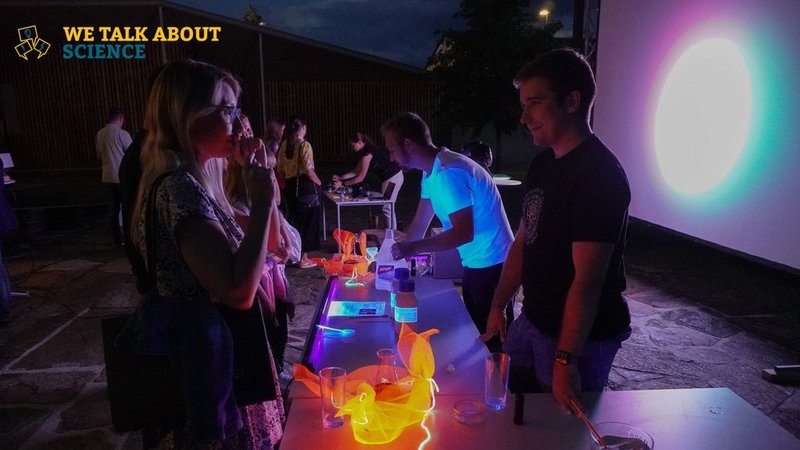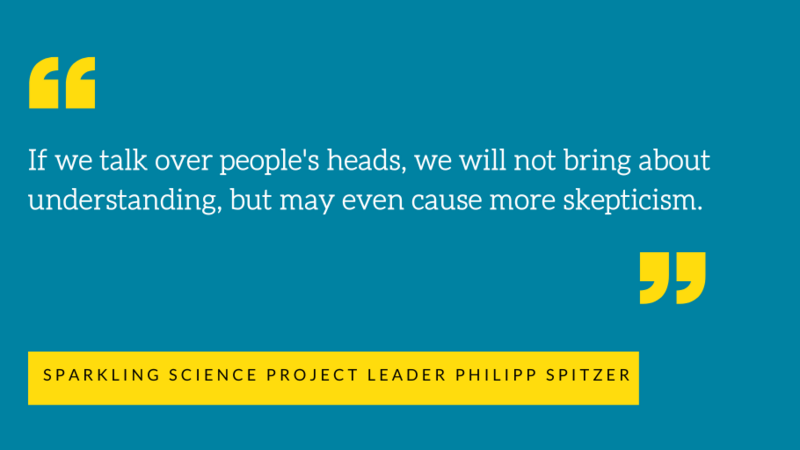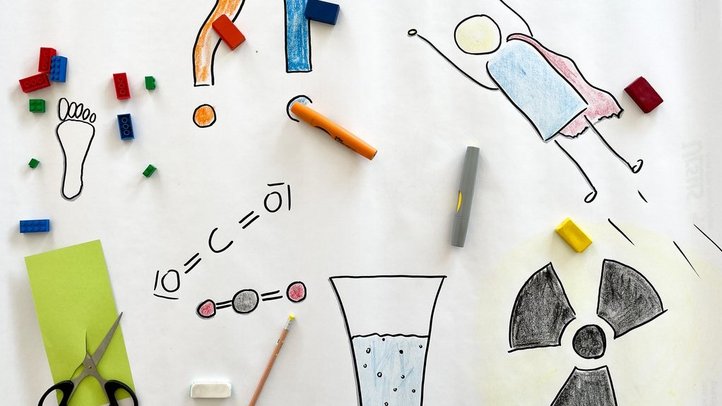Science communication with and for children and teenagers
In the new Sparkling Science project "We talk about science", the University of Graz is exploring how trust in science can be promoted through participatory communication.
How do you explain to children and teenagers what your project is about?
We talk to children and teenagers about three things: What is science? What constitutes science? How do scientists talk about their own research? The project consists of different steps.
At the beginning, we look together with them at what scientists communicate on the topics of "CO2" and "radiation. It is very important for us to find out what they understand about these topics and what questions they have. These will then be answered together with the chemistry students. The next step is for the children and teenagers to take action themselves: They choose a person and explain these topics to him or her. In the process, they are supported by students in creating social media content, videos or graphics. In this way, they get to know science communication up close.
We researchers take a look at how the schoolchildren communicate and would like to learn from this how science communication can be made comprehensible and attractive to schoolchildren in the future. The highlights are the Science Cafés at the end of the project. Here, the schoolchildren have the opportunity to present their results and act as science communicators themselves.
How did the idea for this project come about?
The didactics of chemistry at the University of Graz has been working for some time on the identification and explanation of scientific phenomena in everyday life. This has already been implemented in some examples in the "SpottingScience" project. For example, we explain scientific phenomena on the mountain on the Dachstein glacier. With the help of "ScienceSpotlights" we encourage visitors to get to the bottom of the phenomena with small experiments. These have proved to be very popular and have aroused the curiosity of many people.
We create such "ScienceSpotlights" with students in the courses of the chemistry teacher training program. Our finding is: subject didactics and science communication contain similar elements, yet both sides can still learn a lot from each other. In our many activities with schoolchildren, we saw that they often do not even perceive science communication products on topics such as "Covid-19" and in some cases do not even understand them technically. We now want to find out how this can be improved.

Why did you decide to involve schoolchildren from both primary and secondary schools in your project? The age groups and the associated competencies are quite different.
High school students deal with scientific content in the subjects of physics, chemistry and biology. Thus, it is obvious to investigate the topic of "science communication" with this target group. We chose the primary level because the enthusiasm for science is extremely high in elementary school and we asked ourselves to what extent it is already possible to communicate about science or scientific topics there.
Of course, science cannot be taught at the same level in elementary school as in secondary school or for adults, but we want to take advantage of this incredible enthusiasm.
How was the cooperation with schools in the course of the application?
The cooperation with the schools during the application process was very pleasant. In some cases, there was already contact beforehand. Some schools are new and are participating in a Sparkling Science project for the first time. There is already cooperation with the Stieglerhaus cultural center in St. Stefan ob Stainz. Here, the wish was to do more in the direction of natural sciences and to bring the university more strongly into the village. Therefore, we found open ears with our research idea and were able to get the whole community on board: The elementary school and the middle school are involved in the project. The local kindergarten also asked if we could involve them in order to deal with scientific topics here as well. That made us very happy, of course.

Is there anything you are particularly looking forward to in the project?
The project consists of three exciting areas of work: 1. working with schoolchildren at school, 2. working with student teachers, and 3. presenting and implementing the results in the respective cultural centers. I am particularly looking forward to the presentation of the pupils' products in the context of "science cafés" in the respective cultural centers. I find it fascinating to see how a place discusses scientific topics and how the pupils as "nuclei" communicate science from their point of view.
A second highlight for me is the planned science experiment evenings. Our goal is also to get the local population involved in the project. The first experiment evening, "Fireflies and Gin and Tonic," in the summer 2022 at the Stieglerhaus was a complete success. The experiment stations on an over-the-top topic encourage conversations about natural sciences in a relaxed atmosphere and cause one or the other amazement - no matter whether young or old.
According to the European Commission's latest Eurobarometer survey on the attitudes of EU citizens toward science, the Austrian population is more skeptical than average about science. What has been your experience in this regard?
Of course, the Eurobarometer survey paints a rather grim picture. I myself have actually experienced skepticism about science. For many people, science and the natural sciences in particular don't seem to play such a big role in everyday life. In the organic market, you buy things supposedly without chemicals; at the hairdresser's, bleaching and coloring are "natural"; and even when it comes to food, you don't think much about it.
However, scientific knowledge can also be very helpful in everyday life. Let's take the current topic of "saving energy" for example. With scientific knowledge, I can assess much better how I can implement that. Then it also becomes clear very quickly that tea light stoves or other miracle cures are not useful. I can explain that very easily with chemical and physical knowledge. I believe that some people need people who can bring these scientific phenomena closer to them and especially make their relevance clear. Science should not be a black box and take place behind closed doors.

What does science communication mean to you?
In my opinion, science communication is more important than ever. But we should think more about the requirements of the target group we are communicating with. What are prior knowledge, experiences and how significant is the topic for them? That brings us back to school and teacher training. Again, an important aspect is to think about the ideas of the target group or to research them in subject didactic research. If we talk over people's heads, we will not bring about understanding, but may even cause more skepticism.
There was a chance to meet Philipp Spitzer again at the online panel discussion "Forschen(d) lernen. Practical science education for children and young people" on December 14, 2022. In the review, interested parties will find a short summary of the discussion (including the director of the ZOOM Children's Museum).
More information
- Sparkling Science project: „We talk about science“
